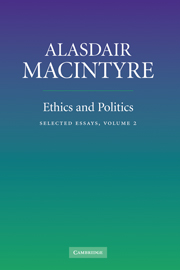Book contents
- Frontmatter
- Contents
- Preface
- Acknowledgments
- PART I LEARNING FROM ARISTOTLE AND AQUINAS
- PART II ETHICS
- PART III THE POLITICS OF ETHICS
- 8 Three perspectives on Marxism: 1953, 1968, 1995
- 9 Poetry as political philosophy: notes on Burke and Yeats
- 10 Some Enlightenment projects reconsidered
- 11 Social structures and their threats to moral agency
- 12 Toleration and the goods of conflict
- Index
8 - Three perspectives on Marxism: 1953, 1968, 1995
Published online by Cambridge University Press: 27 January 2010
- Frontmatter
- Contents
- Preface
- Acknowledgments
- PART I LEARNING FROM ARISTOTLE AND AQUINAS
- PART II ETHICS
- PART III THE POLITICS OF ETHICS
- 8 Three perspectives on Marxism: 1953, 1968, 1995
- 9 Poetry as political philosophy: notes on Burke and Yeats
- 10 Some Enlightenment projects reconsidered
- 11 Social structures and their threats to moral agency
- 12 Toleration and the goods of conflict
- Index
Summary
1953 FROM THE STANDPOINT OF 1995
When in 1953 I published Marxism: An Interpretation, later to become with some revisions Marxism and Christianity, Stalin was not yet dead and the Cold War had already taken determinate form. In February 1953 NATO created a unified military command. In June the Soviet suppression of a workers' rising in East Berlin exemplified the ruthless subordination of the whole of Eastern Europe to Soviet interests. It had already long been part of the stock-in-trade of many Western apologists to accept at its face-value the Soviet Union's claim that its social, political, and economic practice embodied Marxist theory, in order to justify their own root-and-branch rejection of Marxism. And it was generally, if not universally, taken for granted among both theologians and ordinary church-goers that, because Marxism was an atheistic materialism, and because persecution by Soviet power was designed to deny, so far as it could, any independence to the lives of the churches, Christianity had to identify itself with the cause of the anticommunist West. It was of course true that some parts of Marxist theory and some Marxist predictions had genuinely been discredited. It was also true that Christian orthodoxy could not but oppose that in Marxism which was either a ground for or a consequence of its atheism. But the simple-minded wholesale anticommunist rejection of Marxism and the equally simple-minded understanding of the relationship between Marxism and Christianity as one of unqualified antagonism exaggerated and distorted these truths in the interests of the then dominant Western ideology.
- Type
- Chapter
- Information
- Ethics and PoliticsSelected Essays, pp. 145 - 158Publisher: Cambridge University PressPrint publication year: 2006
- 3
- Cited by



